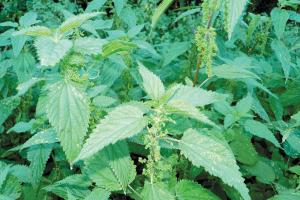Stinging nettles have many unexpected uses
Mary, Queen of Scots did not invent golf, but she may have invented the caddy, or at least the English word caddy, said to come from Mary's use of the French word cadet.
She slept on linens made of stinging nettles, which is not as shocking as it might seem. The weed stinging nettle (Urtica dioica) was once used as a substitute for linen; when processed into cloth, the sting is long gone.
Stinging nettle is a hardy perennial that will grow up to 4 feet tall and is cold hardy in USDA zones 4 through 9. The bristly hairs of this weed act as a hypodermic, injecting an irritant under the skin when touched.
But why would you want to grow a weed, much less one that stings?
Thankfully, drying or cooking removes the stinging effect of the leaves, and once safe to handle, the stinging nettle is one of the most valuable plants in cultivation. The leaves are used in low-salt diets. Nettle shoots are rich in iron and vitamin C. You can boil the leaves with onion and make a delicious and very nutritious nettle soup. Or steam the leaves and use as you would spinach. Even though rare tortoiseshell butterflies thrive in nettle patches, fresh stinging nettle leaves will keep bugs out of cupboards.
You can make nettle wine, even nettle champagne. Before the popularity of hops, stinging nettles were used in English beer as the main bittering agent.
Stinging nettle leaves boiled in salted water produce a vegan rennet substitute for cheese making. A rinse of nettle is said to get rid of dandruff. Nettle leaves make a striking permanent green dye, popular in Russia to dye woolens. Nettle roots boiled with alum produce a yellow dye.
Nettle plants make a very effective liquid fertilizer. Cover a bucketful of nettles with water with a tablespoon of honey or molasses, and let it stew for a week to produce a strong-smelling tea. Adding some rosemary or other strong herbs can help eliminate the odor. When diluted 10 to 1 with water, this organic liquid fertilizer is safe to use on every plant in your garden, especially tomatoes and squash.
Seeds are available from Johnny’s (877-564-6697), Seeds of Change and Richter’s (800-668-4372).
The seeds are tiny with about 180,000 seeds per ounce. Sow the seeds directly in the garden anytime from spring through early fall. The seeds germinate easily and the plants need little care. They are, after all, weeds.
Grow a patch of stinging nettle for healthy greens, a spring tonic, delicious soup, an organic fertilizer, a dye for woolens and even stinging nettle sheets like those of Mary, Queen of Scots. As for Mary, Queen of Scots? She was beheaded by her cousin, Queen Elizabeth I of England. Now that stings.














































